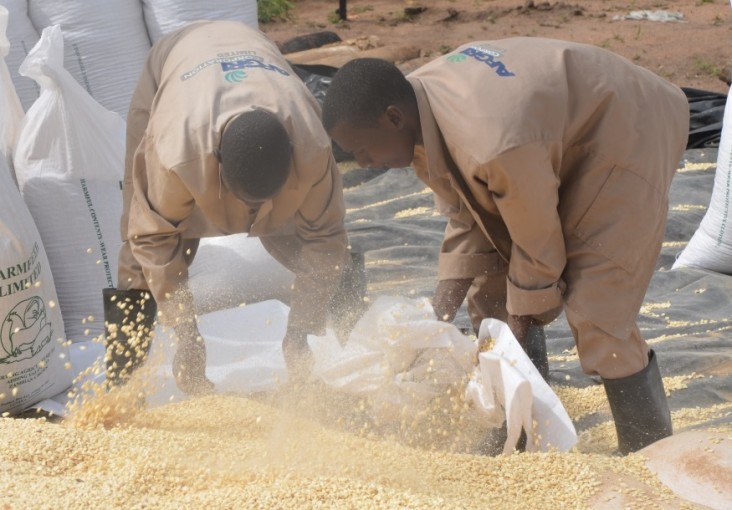
Small farmers in rural Zambia face many hardships when attempting to sell their grain. Long distances to market, non-competitive pricing and the lack of immediate payment hinder farmer incomes and dampen food security in the country.
Through a Strategic Partnership Grant, USAID’s Southern Africa Trade Hub is supporting AFGRI Limited to improve grain storage and structured trade in Zambia. AFGRI, a diversified agri-services company, buys maize and soy from farmers and other traders, offering either instant payment or high-quality storage for their grain. Catalyzed by the grant from USAID, AFGRI was able to build a storage depot in Patauke in the eastern province of Zambia that enabled the company to purchase 4,000 tons of grain this season, as opposed to 1,200 tons the previous season. The satellite depot feeds into the company’s main silo operations in Lusaka and Kabwe, offering farmers in Eastern Zambia a market for their maize and soy.
The grant from USAID financed a new office at the depot to house a laboratory and necessary materials, including moisture and grading equipment to ensure that grain is stored properly with the maximum value retained. Post-harvest losses due to inadequate moisture control, pests and diseases are a significant problem in the country, making grain management important. Due to rigorous controls, AFGRI’s post-harvest losses average only 2% while other storage providers have a much higher loss ratio of up to 35%.
The grant follows USAID’s model of stimulating private sector investment into the grain sector in a sustainable way. Improvements are being made as a result of the grant that will further increase the capacity and effectiveness of the depot. Two electronic weigh bridges will be installed soon that automatically weigh grain as it is driven across by truck. This eliminates the need to move grain manually onto a platform scale and the “double-handling” of the product. An additional depot is being planned for Northern Zambia as well to take advantage of that rich farming area. The Trade Hub is also advising Afgri Zambia how to leverage competitive financing to increase their capacity to buy more grain from small farmers in remote areas throughout the country.
With the help of USAID, AFGRI is now able to reach out to more farmers throughout the country, offering a quality market for grain and ready cash for paying necessary household expenses and investing back into their farms. “Through [USAID’s] help I am sure my grandchildren will be able to go further,” notes small scale farmer George Sacara, who sold his maize to AFGRI. “We have seen that the future will be bright.” By strengthening an effective private sector partner,
USAID is improving grain storage in Zambia and increasing structured trade, which helps farmers, contributes to food security and encourages exports by helping the country establish a surplus of grain.







Comment
Make a general inquiry or suggest an improvement.